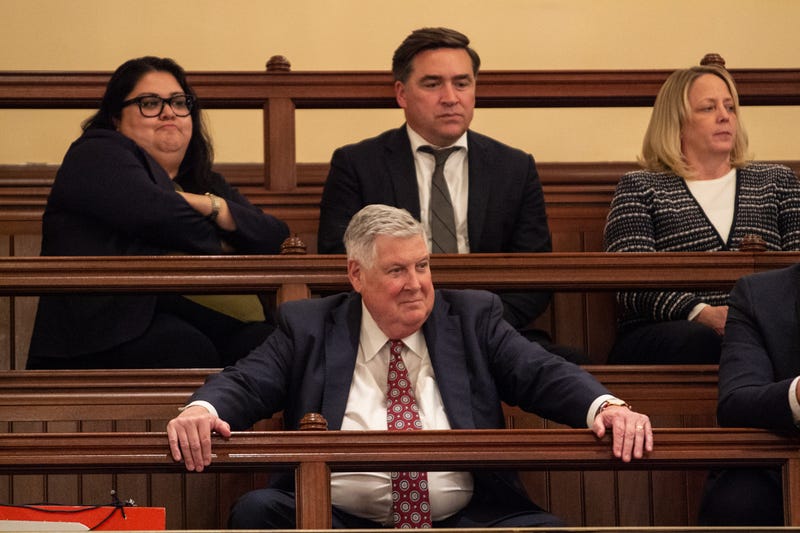
Chicago-area public transportation agencies won’t need to raise fares, cut routes or lay off workers next year after state lawmakers approved a bill overhauling public transit, the head of the Regional Transportation Authority said Thursday.
The RTA held a special meeting to approve new funding projections for 2026 through 2028 based on revenue estimates from new funding sources for public transportation. Those were approved by the General Assembly last week in Senate bill 2111, which Gov. JB Pritzker said he will sign.
The new funding is good news for the future of public transportation in the Chicago area, RTA Chair Kirk Dillard said.
“We can say confidently that in 2026 we will not see any cuts to service,” Dillard said. “We will not see any layoffs pending our action today, and riders will not see fare increases, and instead, will continue to see improvements in service.”
The RTA’s three service boards — Metra commuter rail, Pace Suburban Bus and the Chicago Transit Authority — are set to approve their 2026 budgets this month before submitting them to the RTA for approval in December. Before lawmakers passed a reform bill last week, Metra and the CTA had been planning to increase fares next year in anticipation that pandemic relief funding would run out and state lawmakers would not have approved new funding sources.
Instead, the legislature approved a $1.5 billion increase in annual funding for public transportation statewide by dedicating sales tax revenue from motor fuel purchases and interest from the Road Fund to public transportation. The bill also requires the RTA board to approve a 0.25 percentage point increase next summer to the existing regional sales tax that funds Chicago-area public transportation.
“The new revenue is going to be coming and it’s going to be given a clear direction — and has been given a clear direction — on how we should spend much of it from legislators,” Dillard said. “This board still has very, very, very important work to do as the RTA as we know it.”
New revenue expectations
Much of the new funding won’t flow into the system until later in 2026, RTA Senior Deputy Executive Director Maulik Vaishnav said. But next year’s — and future years’ — funding will be more than enough to close the fiscal cliff.
The agencies collectively faced a $230 million deficit in 2026 that would increase to $834 million in 2027. The RTA now expects the agencies to receive $565 million in additional funding next year and $1.3 billion more in 2027 and 2028.
Lawmakers also wrote governance “efficiencies” into the bill, which the RTA has projected will save the agencies additional money going forward.
Less money will also come from fares. Before the pandemic, Chicago’s transit agencies were required by state law to receive half of their revenue from fares. That requirement is being lowered to 25% starting next year before declining to 20% in 2030. However, Vaishnav said he expects lawmakers will need to make unspecified changes to the laws governing the future Northern Illinois Transit Agency to allow NITA to comply with that requirement beginning in 2030.
RTA board’s future
The terms of the current RTA board members will expire on Sept. 1 next year and give way to the new NITA board by the end of September 2026, according to the bill.
It also outlines a series of new NITA responsibilities, particularly on public safety and coordinating planning for the agencies. Board member Nora Ryan said the RTA should defer decisions about using the new funding to the future NITA board and not make its own policies about how it should be spent.
“I think it’s our responsibility in this moment to just kind of keep things going to make sure that there is a smooth transition and handoff to these folks,” Ryan said. “And so I would caution that we not jump too far ahead on stuff that’s happening right now.”
Several key changes for riders are also likely still several years away. The bill calls for implementing a new universal fare collection system by early 2030. It also establishes a series of dates by which NITA must complete a series of studies. But it doesn’t require the agencies to follow a coordinated regional service plan until 2029.
RTA Director of Government Affairs Rob Nash also told board members some errors have been found in SB2111 that will likely require lawmakers to pass follow-up legislation to ensure the bill accomplishes what lawmakers intended.
Even so, RTA board members expressed excitement about the future of public transportation in Chicago.
“I’ve always dreamed about ... having our system in Chicago be something like what major cities in Europe and Asia have, like transit that’s coming every five minutes, and reliable and safe,” board member Dennis Mondero said. “And what happened in Springfield last week is really a major step toward doing that.”
Capitol News Illinois is a nonprofit, nonpartisan news service that distributes state government coverage to hundreds of news outlets statewide. It is funded primarily by the Illinois Press Foundation and the Robert R. McCormick Foundation.
